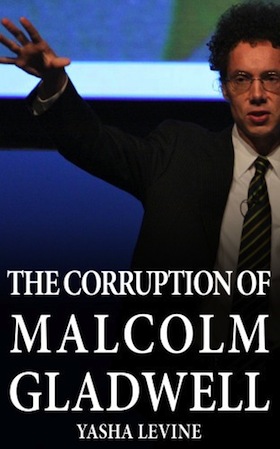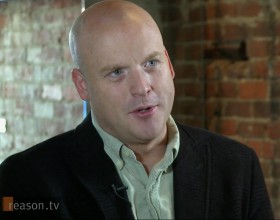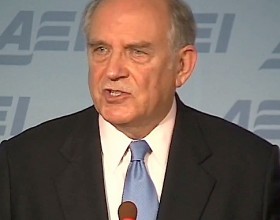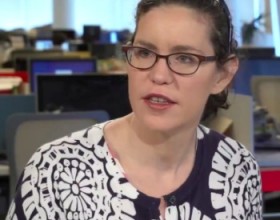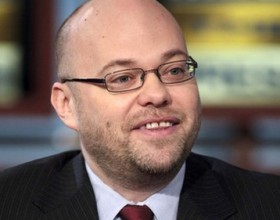
Remember Ally Bank's conflicted funding of NPR financial news program Planet Money? Well, turns out NPR is much more compromised than we ever imagined. Even its coverage of education issues is rife with biased reporting and undisclosed conflicts of interest that tie NPR to some of the most powerful pro-school privatization interests in the country.
Yasha Levine reports in NSFWCORP...
***

Et Tu NPR?
Last week, I wrote about the nation’s first successful “parent trigger” privatization of a public school, in a isolated town on the edge of the Mojave Desert. In that piece, I mentioned how parents and teachers had become disillusioned by the biased reporting of parent trigger in the media.
“No matter what article I read, it seemed to me that the common perspective that was shared was pro-Parent Revolution,” said La Nita M. Dominique, the local Adelanto president of the state teachers union, referring to the outside pro-charter front group that descended on their community and used harassment, deception and thinly veiled threats of deportation to push parents into signing a petition that handed over their kids’ school to a private contractor.
Lori Yuan, a mother of two kids Desert Trails and a member of Adelanto’s planning commission, described feeling that she was caught in some kind of grand conspiracy that was bigger and more powerful than anything she could imagine.
“I would do these interviews with these people and reporters and journalists and bloggers. Anyone that would call I would talk to because I need to get this information out because people need to know this. And then I’d get the article and I’d be like this has nothing to fucking do with what I said. I got to the point when I started thinking, do they — and by they, I mean Parent Revolution — do they own everything? [D]o they own the newspapers?”
It’s easy to paint this as the paranoia of parents who feel like the media doesn’t understand their concern about parent trigger. That was my first impulse too. And then I started reading some of the coverage.
It didn’t matter if it was Fox News, NPR, the Washington Post, LA Weekly or the local right-wing newspaper: coverage of parent trigger issues would invariably have the same pro-privatization bias, even down to their use of the same stock phrases about “parent empowerment” and the need give parents the ability to “reform” a system that protects lazy public school teachers and their sleazy their union cronies.
All very strange — until you start connecting the dots between the financial backers of pro-parent trigger groups like Parent Revolution and the media industry.
As I wrote in my earlier piece, Rupert Murdoch has announced his plans for expansion into private education (“When it comes to K through 12 education, we see a $500 billion sector in the U.S. alone that is waiting desperately to be transformed.”) The Financial Times and The Economist are both owned, or part owned, by Pearson, which has huge interests in education and educational publishing.
Some media organizations would barely survive without their educational arms. The parent company of The Washington Post, for example (which also owns Slate.com, Foreign Policy magazine and other media properties) relied on its for-profit education subsidiary, Kaplan Inc, for 62% of its revenue in 2012.
In these cynical times you might not be surprised to learn that News Corp, The Washington Post Company and Pearson are hugely conflicted in their education coverage.
But then there’s NPR.
What’s not just surprising, but actually shocking, is how far pro-school privatization interests have been able to infiltrate and corrupt the reporting at supposedly left-leaning NPR, and its affiliate public radio stations.
Consider a new NPR local news project called State Impact, which NPR describes as a “local-national collaboration between NPR and station groups in eight states that reports on state government actions and their impact on citizens and communities.”
In January, State Impact published an interview with Greg Harris, the Ohio director of Michele Rhee’s pro-charter school astroturf group StudentsFirst to promote a “report card” that the group released rating Ohio’s state education policies.
State Impact reporter Ida Lieszkovszky had nothing but praise for StudentsFirst, describing it as “a group looking to improve education through increased accountability for teachers and principals, more financial transparency in schools, and enhanced power for parents, is grading states on their education initiatives.”
StudentsFirst gave Ohio a C-, largely because the state did not “evaluate”—aka fire—teachers based on “performance” and limited the number of total charter schools that could be opened. In fact, StudentsFirst gave most states Ds or lower for not firing unionized teachers, for not being nearly pro-charter enough and for not scrapping their “outdated pension systems.” (California got an F, while NSFWCORP’s home state of Nevada got a straight D.)
Lieszkovszky took StudentFirst’s discredited pro-charter blather at face value, and was even nice enough to embed the full report card at the bottom of the article. She also fed the StudentsFirst rep anti-union questions during the interview…stuff like this:
Q: Some of the measures that you mentioned, like tying teacher pay to teacher performance, are things that the teachers’ unions in the state really don’t like. How much of this has to do with unionization in these states?
The interview also included a link to a NPR State Impact profile page for Michele Rhee that reads like it was crafted by Rhee’s publicist, describing her as a crusading reformer trying to “build a national movement to defend the interests of children in public education.” The profile makes no mention of the controversy surrounding Michele Rhee’s reform tactics, which have been discredited in a series of test-score cheating scandals.
NPR might describe State Impact’s coverage of StudentsFirst as “news reporting” but at times it feel closer to outright shilling.
So, why would public radio be so willing to gush about groups like StudentsFirst and their pro-privatization agenda?
Well… it might have something to do with the fact that both NPR’s State Impact and Rhee’s StudentsFirst are funded by the same pro-privatization groups. In this case, the Walton Family Foundation, which has been funneling over $100 million a year to various right-wing efforts to break teachers unions and privatize public education—and that includes both NPR and StudentsFirst.
In 2012, the foundation gave Rhee’s StudentsFirst $2 million. That same year, it cut NPR a hefty check cut NPR a hefty check for $1.4 million. The foundation classified both handouts—one to a respected news organization; the other to a notorious astroturf outfit—as “K-12 Education Reform Grants” to “Shape Public Policy.” Among other grantees funded under this category include the the ultra-libertarian Institute for Justice and the National Right to Work Legal Defense and Education Foundation, both Koch-connected outfits involved in the nasty business of busting unions.
How much of the Waltons’ $1.4 million NPR grant went specifically to fund the State Impact project is not entirely clear, but State Impact does list the Walton Family Foundation as a major donor on a “Supporters” page, hidden several clicks away from the program’s homepage.
Looking through NPR’s recent education coverage, it becomes clear very quickly that this glaring conflict-of-interest is not one-off event or an accidental editorial misstep.
In fact, pro-charter school bias and undisclosed conflicts-of-interest run rampant through NPR’s education reporting. Take the Bill and Melinda Gates Foundation. Over the past decade, it has funneled around $8.5 million to National Public Radio and its affiliate stations and networks, according to data compiled by the Seattle Times. And a good chunk of that money was specifically earmarked for “improving” NPR’s education reporting.
For example: In 2009, the foundation gave National Public Radio a grant of $750,000 to “support coverage of education issues on NPR programs, including the ‘Morning Edition’ and ‘All Things Considered’.” That same year, it sent another $651,768 to Minnesota Public Radio/American Public Media to “strengthen the quality and quantity of reporting” on education issues. American Public Media produces NPR’s Marketplace programming, which has also come under the corrupting influence of Wall Street and pro-austerity interests. (Read our previous reporting on that issue here, here, and here.)
A combined total of nearly $3 million from Gates and the Waltons? That’s a whole lot of money just for education coverage — and all of it’s coming from two of the biggest backers of the push to privatize public education.
As recent investigation by Dissent magazine found that private philanthropies spend a combined $4 billion a year to hand public K-12 education to the private sector. The Gates and Walton foundations sit at the top of the food chain, funneling hundreds of millions of dollars in philanthropic gifts to increase their leverage over a sector that’s worth up to $1 trillion a year.
In 2011, the New York Times reported on the incredible scope of Gates’ funding of education issues.
The foundation spent $373 million on education in 2009, the latest year for which its tax returns are available, and devoted $78 million to advocacy — quadruple the amount spent on advocacy in 2005… “It’s Orwellian in the sense that through this vast funding they start to control even how we tacitly think about the problems facing public education,” said Bruce Fuller, an education professor at the University of California, Berkeley, who said he received no financing from the foundation.
And sure enough, hosts and reporters of those NPR programs routinely struggled to cover charter schools, parent trigger campaigns and pro-charter outfits funded by Bill Gates and the Walton family in a positive light, all while keeping readers and listeners in the dark about the NPR’s financial conflict of interest.
Here are just a few examples:
In December 2012, NPR’s Morning Edition ran a six-minute segment titled, “In California, Parents Trigger Change At Failing School” about Parent Revolution and its parent trigger campaign in Adelanto.
The program described Parent Revolution in generally positive terms and gave a lot of air time to Ben Austin, the Beverly Hills political operative who runs the group and helped push the parent trigger law through California’s legislature in 2010. It also aired the unsubstantiated rumors spread by Parent Revolution that the nefarious teachers’ union threatened undocumented immigrants were with deportation if they signed Parent Revolution’s trigger petition. (As I revealed in my “Pulling the Trigger” piece, the exact opposite was true: Parent Revolution was offering to help fix the immigration problems of undocumented parents in return for their support of the parent trigger campaign.)
In the end, NPR conceded that Parent Revolution’s campaign was “incredibly disruptive” to the community, but concluded that it was a step in the right positive direction:
“Still, giving parents the right to take over a failing school is a powerful idea. With the financial backing of influential groups like the Gates, Broad and Walton Foundations, the parent trigger is expected to spread beyond Adelanto.”
And, while the program identified the Gates and Walton foundations as funding Parent Revolution and the parent trigger movement (the two foundations gave a combined $7.8 million to Parent Revolution from 2009 to 2012), NPR didn’t see fit to tell listeners that Walton and Gates were also major funders of their own education coverage.
But this wasn’t NPR’s first mention of Parent Revolution and Adelanto. Two months earlier, in September 2012, it had broadcast another parent trigger conflict-of-interest fluff job: a segment on Talk of the Nation called “Parent-Trigger Laws: A Bold Plan To Save Schools.”
For nearly 15 minutes, host Neal Conan promoted “Don’t Back Down,” an “issues” movie in which indie superstar Maggie Gyllenhaal uses the parent trigger law to fight back lazy school teachers and their corrupt union bosses. Conan then used the film (which was produced by right-wing billionaire and school privatization supporter Phillip Anschutz) to describe a real life parent trigger campaign that was being waged by Parent Revolution in the desert town of Adelanto.
Here’s Conan introducing the segment:
Maggie Gyllenhaal and Viola Davis star as a fed-up parent-teacher combo who mobilized to take on the bureaucrats and the union. . . . The story is fiction, but the theme and controversy the film taps into are very real. Several states have passed what are known as parent-trigger laws, which give parents a pass to make changes in failing school: a new curriculum, longer school days, different personnel. They can even take over, entirely, and turn it into a charter school.”
Conan’s sole guest was Sean Cavanagh, an assistant editor at the influential Education Week magazine.
Cavanagh praised parent trigger “reform” law, and described Adelanto’s parent trigger campaign as having wide parent support: “I can’t think of many issues where it’s easy to get, you know, 51 percent of parents at a school behind – behind any effort.”
And this is where NPR’s coverage got real sleazy.
See, not only was NPR’s Conan doing a fluff piece on a corporate front group bankrolled by two of the radio network’s major funders, without disclosing this conflict-of-interest to readers. But Cavanagh, the sole expert invited onto the program to talk about these issues, was also being paid out of the same bucket, and he wasn’t saying anything about it either.
In 2011, the Gates Foundation gave Education Week a $2 million grant to support coverage “focusing on the education industry and innovation in K-12 education.” The foundation gave the Education Week an additional $5.2 million from 2005 to 2009 to create “special reports on education”
Among other duties, Cavanagh runs Education Week’s “Charters & Choice” blog. A few days ago, that blog boosted a study published by Friedman Foundation for Educational Choice that supposedly shows how school vouchers and other school privatization schemes “can help boost the academic performance of students making use of those programs.” As it turns out, Friedman Foundation for Educational Choice, which was founded by Milton Friedman and his wife Rose in the mid-90s, is also funded by the Waltons. Their foundation gave the outfit a combined $1.02 million from 2011 to 2012.
So not surprisingly, talking to Conen on NPR, Cavanagh had nothing but kind words to say about Parent Revolution:
That’s right. That’s right. Parent Revolution has been helping the parents from the very beginning. Their director is Ben Austin, who’s actually a former Clinton administration, White House official. And they’ve been very active in trying to help the parents carry this movement forward. At the same time, you know, they make the argument, look, this is a parent-led effort, and we are going to do what the parents at Desert Trails Elementary want.
Let’s go through that again: here we have a NPR program in which everything—the host, the interviewee and the subject being discussed—are all funded by the same pro-privatization outfits. And disclosures? Not a single one.
Read full story on NSFWCORP.com (subscription required)...
